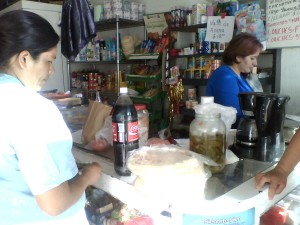Once the most dangerous city in the world, Juárez struggles to prosper again
|
CIUDAD JUÁREZ – Patricia Martinez welcomed two men into her “Pacífico” bakery in downtown Juárez one late afternoon in December 2010. She greeted them with a smile as she did with all her customers without imagining that the encounter would change her life forever. Martinez thought they were just customers shopping for some pan dulce or homemade food. While Patty – as her friends and family call her – stood behind the counter, one of the men approached her holding a gun in his hand and, told her in a hushed voice that they were demanding “la cuota,” an extortion payoff. The man said that if she wanted her family to be safe and her businesses to remain open she had to pay 2,000 pesos, or around $155, every week.

